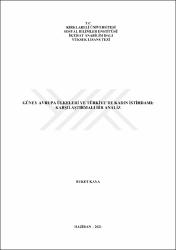Güney Avrupa ülkeleri ve Türkiye'de kadın istihdamı: Karşılaştırmalı bir analiz
Abstract
Bu tez çalışmasının amacı, Güney Avrupa refah devleti kabul edilen ülkelerde ve bu ülkelere benzerlik gösteren Türkiye'de kadın istihdamının durumunu incelemektir. Bu çerçevede öncelikli olarak, kadın istihdamını etkileyen faktörler incelenmiştir. Bununla birlikte, İspanya, İtalya, Yunanistan ve Türkiye'de istihdamın yapısı, kadın istihdamının demografik yapısı, aile ve kadın istihdamına yönelik politikalar, çocuk bakım hizmetleri, ebeveyn izinleri ve esnek çalışma koşulları da incelenmiştir. Çalışmanın sonucunda çalışmaya konu olan ülkelerin kadınların istihdamda karşılaştığı sorunlar açısından benzerlik gösterdiği görülmüştür. Bununla birlikte bu ülkelerde kadın istihdamı, hizmet sektörüyle birlikte artışa geçmesine rağmen halen diğer Avrupa Birliği ülkelerinin gerisinde kalmıştır. Söz konusu ülkelerde kadın istihdamının geri kalmasındaki en büyük nedenlerden birisi olarak, geleneksel yapıdaki aile modeli göze çarpmaktadır. Geleneksel aile modeli sonucunda, kadının ev içi sorumlulukları ve çocuk bakımını benimsediği görülmüştür. İstihdam açısından bakıldığında ise, toplumdaki cinsiyetçi yapı sonucunda kadınlara sağlanan imkânların oldukça sınırlı olduğu görülmektedir. Çocuk bakım hizmetleri açısından, bu ülkelere sağlanan sosyal yardımlar oldukça sınırlıdır. Çalışmaya konu olan ülkeler kendi içinde değerlendirildiğinde, 2019 verilerine göre, kadın iş gücüne katılım oranının en yüksek olduğu ülke İspanya'dır. Türkiye ise kadın iş gücüne katılım oranı olarak bu ülkeler arasında en düşük orana sahiptir. The purpose of this thesis, Southern European welfare state adopted countries and are similar to these countries is to examine the status of women's employment in Turkey. In this context, factors affecting women's employment were primarily examined. However, Spain, Italy, Greece and the structure of employment in Turkey, the demographic structure of women's employment, family, and policies for women's employment, child care, parental leave and flexible working conditions was also examined. As a result of the study, it has been observed that the countries studied show similarities in terms of the problems faced by women in employment. However, although women's employment in these countries has increased along with the service sector, it still lags behind other European Union countries. The traditional family model stands out as one of the biggest reasons for the underdevelopment of female employment in these countries. As a result of the traditional family model, it has been observed that the woman has adopted domestic responsibilities and childcare. In terms of employment, it is seen that the opportunities provided to women are quite limited as a result of the sexist structure in society. In terms of childcare services, social assistance provided to these countries is very limited. When the countries subject to the study are evaluated within themselves, according to 2019 data, the country with the highest rate of female labor force participation is Spain. The female labor force participation rate in Turkey has the lowest rate among these countries.
URI
https://tez.yok.gov.tr/UlusalTezMerkezi/TezGoster?key=8tbPippmWV_b-Irrn9YEApPOFCHTk_nbAlZ9xfEPln1WZxQvK5EJvfZmRy7QNigAhttps://hdl.handle.net/20.500.11857/1543
Collections
- Tez Koleksiyonu [311]



















